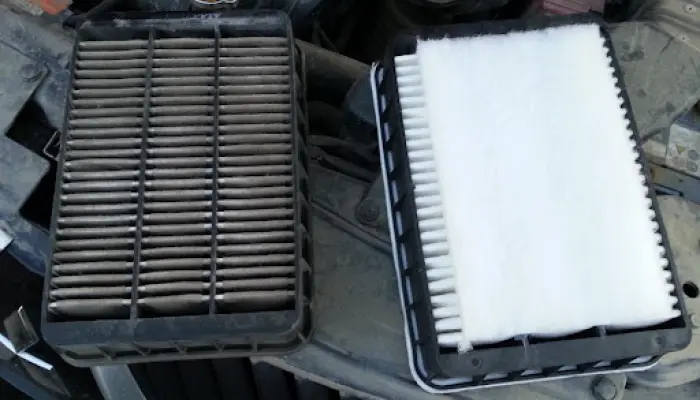To ensure optimal engine performance, certain conditions are necessary, including the correct ratio of fuel to air to achieve maximum combustion efficiency. Typically, 15 to 20 parts of air are required for every 1 part of fuel (depending on the engine configuration).
During driving in a standard passenger car with an engine capacity of 1.5 to 2.0 liters, approximately 12–15 cubic meters of air are needed for every 100 kilometers. However, the air coming from the surrounding environment contains road dust, insects, pollen, and other debris. Here, the air filter plays an important role. Its functions include:
- Cleaning incoming air by 99.9%, preventing debris from entering the engine;
- Reducing the level of noise entering through the intake tract;
- Participating in heat exchange during the preparation of the fuel-air mixture (for gasoline engines).
Frequency of filter replacement
Manufacturers recommend replacing this element according to the technical regulations (according to the vehicle's passport). The technical manual of each manufacturer usually specifies the replacement periods for fuel, oil, and air filters.
Usually, it is recommended to replace the filtering element every 10,000 kilometers of mileage, assuming standard vehicle operation (city driving, on paved roads, in regions with average levels of dust in the air).
Signs of the need to replace the air filter
The filtering element should be replaced if you notice the following signs:
- Popping in the exhaust system;
- Rough engine operation, changes in RPM;
- Significant increase or decrease in fuel consumption;
- Decreased acceleration dynamics, worsening overall performance;
- Starting problems, more frequent cooling activation;
- Changes in engine performance in humid weather.
If you notice one or more of the listed signs, it is recommended to replace the air filter immediately.
Factors reducing the filter's service life
There are several factors that can reduce the service life of the air filter, including:
- Driving in rural areas with a high amount of dust;
- Poor road conditions, including potholes and deteriorated pavement;
- Driving in traffic jams, on sand, or in smog;
- Nighttime trips in spring and summer due to insects;
- Driving in conditions where there is a high content of dust in the air, such as on construction sites.
Considering these factors, it is necessary to pay attention to the condition of the air filter and, if necessary, replace it promptly.
Ways to extend the service life of filters
To extend the service life of filtering elements, it is recommended to:
- Purchase quality components;
- Regularly check the tightness of the filter housing;
- Properly install the filtering element, avoiding air leaks;
- Carefully inspect new elements for defects before installation.
It is important to remember that using a dirty filter can significantly reduce engine life and shorten the service life of other vehicle components.
